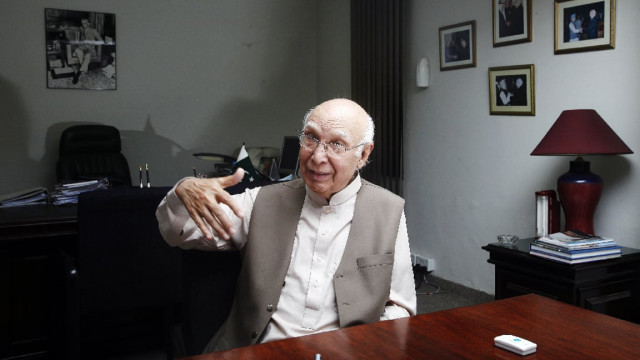Breakthrough expected on drone issue, says Sartaj Aziz
Says Pakistan condemns use of chemical weapons but does not support military intervention in Syria either.

Adviser to the Prime Minister on Foreign Affairs and National Security Sartaz Aziz. PHOTO: REUTERS
He said that in Pakistan's forthcoming meetings with US authorities, they will be asked to stop drone strikes as they were counterproductive. He also said that UN Secretary General Ban Ki-moon had supported Pakistan's stance on the issue.
Condemn chemical weapons, but no to Syrian intervention
Aziz said that Pakistan will maintain a stance of non-interference with respect to the ongoing situation in Syria.
Addressing the National Assembly, Aziz said that Pakistan condemns the use of chemical weapons, but it does not support aerial strikes which US proposes as it will only make the situation "more concerning".
"We should wait for the UN mission's report on Syria," he added.
Aziz said that Pakistan's stance on Syria is based on the principles of international law and UN Charter to respect the territorial integrity of Syria and to maintain a policy of non-military intervention and interference even under Right to Protect.
'Afghanistan is important'
Furthering his claim of Pakistan following a non-interference policy with its relation to other countries, Aziz said that Pakistan is not partial to any political party in Afghanistan and wants to stay clear of its internal matters.
"Afghanistan is passing through a two pronged transition; military and political. Its peaceful culmination is important for us," he detailed, referring to the withdrawal of NATO troops in the country.
Calling President Hamid Karzai's recent visit to Pakistan an important one, he said that it had strengthened bilateral relations between the two countries.
He said the countries will be working together on projects like the Torkham-Jalalabad road, construction of railway track and power project on River Kunar amongst others.
India's wavering stance
"The Prime Ministers of India and Pakistan have talked to each other twice on phone," Aziz revealed, adding that Pakistan was keen on composite dialogue.
He said that India's stance on recent ceasefire violations from India and Pakistan was constantly changing and that they had refused to accept Pakistan's offer for a joint investigation.
"India insists that the Kashmir issue is a bilateral one even though there are numerous UN resolutions through which the issue can be settled according to the aspirations of Kashmiri people," he added.
He said that even if Pakistan tried to resolve the issue bilaterally, there was no progress since India did not give an encouraging response.
"It's not the responsibility of international community to pay heed to these problems," he said, adding that they will need to understand the ground realities shared by the 'two nuclear powers' of the region.
Obama and Sharif to meet next month
The Adviser on Foreign Affairs said that Prime Minister Nawaz Sharif was expected to hold a meeting with US President in New York next month.
Commenting on Pakistan's relation with US, Aziz said that the US only insisted on cordial relations when they wanted something and returned to giving a cold response when the purpose was fulfilled.
"Our government has successfully made US Secretary of State John Kerry realise that Pak-US relations should not be seen through the Afghanistan lens," he said.



















COMMENTS
Comments are moderated and generally will be posted if they are on-topic and not abusive.
For more information, please see our Comments FAQ